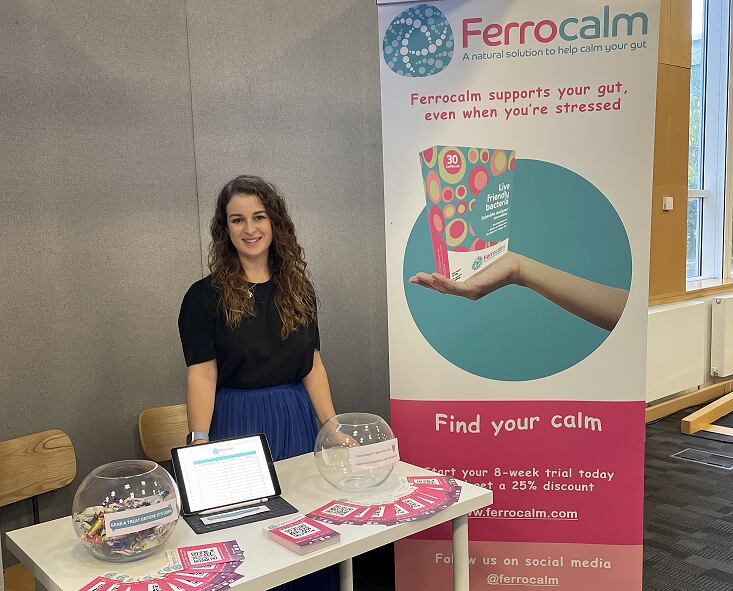Bailey describes how the IBS-targeted streptococcus thermophilus probiotic strain stands out in the booming biotics market by offering a strain which can thrive during periods of high inflammation.
“The unique selling point is that we are targeting the active inflammation. We have something that can specifically work during this.”
Bailey reflects on an early conversation back in 2009, with her colleague and co-founder Tristan Cogan, which started the journey to founding the company.
“We had a chance conversation in the corridor asking, ‘why don't probiotics work in people who have active gut inflammation?’ We know that, for example, people with inflammatory bowel diseases will spend an extraordinary amount of money on probiotics, many of which don't actually have any evidence for efficacy.
“We came up with this idea that maybe this is all due to iron, as when you have active inflammation, you have high levels of iron in the gut.”
She describes how this can result from associated inflammatory bleeding, taking oral iron supplements to address this bleeding, and high levels of noradrenaline; a stress hormone which acts as an iron shuttle, releasing it from its stores and supplying it to gut bacteria.
Bailey explains: “The vast majority of bacteria present within the gut can use the iron as a growth factor. But the species that are conventionally used as probiotics, like lactobacilli and bifidobacterial, can't do this.
“So, in these conditions, they can't compete for nutrients, they get out-competed, and they die off. They can't have a beneficial effect.”
Following this observation, the pair began experimenting and screening 200 strains to identify a probiotic that could have anti-inflammatory benefits within the body utilising iron as a growth factor.
Through this unfunded side-project, including additional in-vitro and safety trials, they successfully identified the FX-856 strain.
“We took that through a mouse model of colitis, and we saw that it reduced clinical signs of the disease. It reduced weight loss and gastrointestinal bleeding, which are two of the key symptoms of IBD.
“At this point, we thought, we’re really onto something now!”
Utilising this strain, they created their GRAS certified, one-a-day, delayed release capsules.
“It's a delayed release capsule, because we know that it has the biggest beneficial effect when it's in the colon. Although there are strains able to survive gastric transit, we wanted to make sure we're getting the biggest dose straight into the colon,” she adds.
IBS prevalence
Bailey emphasises the prevalence of IBS, stating that 15% of the population suffer from the condition.
She continues: “We are living through some of the most challenging times that we've ever faced. People are under huge amounts of stress, and this is having an impact on people’s mental and physical health.
“Conditions like IBS are exacerbated by periods of stress and, at the same time, accessing healthcare can be really difficult at the moment.
Bailey adds that gut issues will usually be treated by doctors using medication and lifestyle advice: “Patients end up coming back again and again, because making those lifestyle changes is hard.
“By giving people access to Ferrocalm, we're giving them access to a tool which they can use alongside other strategies for managing their condition to improve their health and be able to live the life they want to lead."
Consumer research
“We went out and spoke to people with IBS and IBD to find out what they wanted. We envisaged a type of a ‘Yakut’ or ‘Actimel’ yoghurt type drink. But when we went and spoke to people, they said, 'no, we don't like those' - the overwhelming thing that we discovered was that a lot of people who have gut problems will avoid dairy,” Bailey explains with regards to the decision to create a dairy and gluten-free, vegan-friendly product.
She says there are two on-going human trials being conducted by the company, with one due to end next month, involving the administration of the probiotic to 24 individuals over a period of 8-weeks with the subsequent analysis of the microbiome.
“We're getting some testimonials coming back from people which are absolutely fantastic, saying how this has really improved things for people… which is just wonderful,” she describes.
Speaking about the future and product development at FerryX, she adds: “At the moment [the product] works really well, but there is an opportunity to enhance it by doing a consortium product using a number of different strains and potentially introducing some prebiotics that could help it work even better.”

